Dear Zazie, Here is today’s Lovers’ Chronicle from Mac Tag dedicated to his muse. Has your someday come? What leaves you breathless? Rhett
The Lovers’ Chronicle
Dear Muse,
© copyright 2020 mac tag/cowboy coleridge all rights reserved
© copyright 2019 mac tag/cowboy coleridge all rights reserved
must i be reminded
yes, i need it
it is the only way
to feel anything
it comes down like this
contentment
or somethin’
damn near like it
what else could issue thus
bring on the night,
ring out the hour
the days wear on
but this endures
© copyright 2018 mac tag/cowboy coleridge all rights reserved
have you ever wished
that someone
would take you away
someday
someone will come and stay
someday……
then you will feel,
À bout de souffle,
at breath’s end
miss feelin’ breathless
when you were near
© copyright 2017 mac tag/cowboy Coleridge all rights reserved
someday came and left
miss feelin’ breathless
when you were near
© copyright 2016 mac tag/cowboy Coleridge all rights reserved
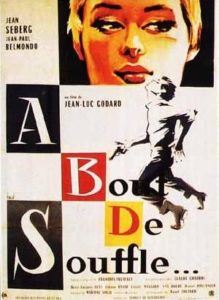 Two more poems. The first inspired by somethin’ you once said to me and the second inspired by a movie I recently watched; the 1960 French film À bout de souffle (Breathless) featurin’ the lovely and talented Jean Seberg and Jean-Paul Belmondo. Consider this the official notification that this film belongs on the must-see film list.
Two more poems. The first inspired by somethin’ you once said to me and the second inspired by a movie I recently watched; the 1960 French film À bout de souffle (Breathless) featurin’ the lovely and talented Jean Seberg and Jean-Paul Belmondo. Consider this the official notification that this film belongs on the must-see film list.
Do you remember when you said you wished someone would take you away?
Someday
Someday
Love will find a way
Someday
Love will come your way
Someday
Love will take you away
Someday
Love will save the day
Someday
Love will come and stay
Someday……
Then you will feel,
À bout de souffle, at breath’s end,
Breathless
Breathless
All over tremblin’
Breathless
Holdin’ on believin’
Breathless
Carried away gettin’
Breathless
Givin’ in to the feelin’
Breathless
Not fearin’ bein’
Breathless……
© copyright 2012 mac tag/Cowboy Coleridge all rights reserved
The two songs of the day are “Someday” by Tegan and Sara and “Breathless” by The Corrs.
My someday came and left. I miss feelin’ breathless when you were near.
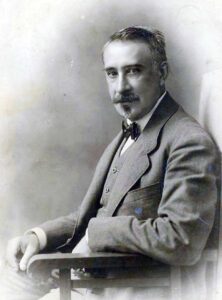 Giorgi “Gigo” Ivanes dze Gabashvili (Tbilisi, Georgia; November 9, 1862 – October 28, 1936 Tsikhisdziri, Georgia); painter, educator and photgrapher. One of the earliest Georgian representatives of the Realist School of Georgian painting, his work is known for covering a wide range of subjects, landscapes and scenes of everyday life through orientalist lens. Although not widely known in the West, Gabashvili’s paintings are highly valued.
Giorgi “Gigo” Ivanes dze Gabashvili (Tbilisi, Georgia; November 9, 1862 – October 28, 1936 Tsikhisdziri, Georgia); painter, educator and photgrapher. One of the earliest Georgian representatives of the Realist School of Georgian painting, his work is known for covering a wide range of subjects, landscapes and scenes of everyday life through orientalist lens. Although not widely known in the West, Gabashvili’s paintings are highly valued.
His photographic archive was unknown until 2012. The photographs were taken in late nineteenth and early twentieth century. It was a time when photography and even art as a whole had to comply with Soviet ideology. Gabashivili’s works mainly included nude photographs of women, which was completely unacceptable. Perhaps that is the reason for late display of his works as a photographer.
Gallery
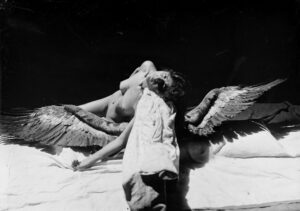
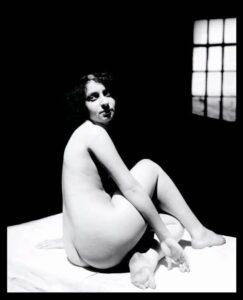
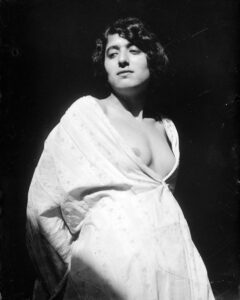
Today is the birthday of Robert Frank (Zürich; November 9, 1924 – September 9, 2019 Inverness, Nova Scotia.); photographer and documentary filmmaker, who became an American binational. His most notable work, the 1958 book titled The Americans, earned Frank comparisons to a modern-day de Tocqueville for his fresh and nuanced outsider’s view of American society. Critic Sean O’Hagan, writing in The Guardian in 2014, said The Americans “changed the nature of photography, what it could say and how it could say it. [ … ] it remains perhaps the most influential photography book of the 20th century.” Frank later expanded into film and video and exerimented with manipulating photographs and photomontage.
By the time The Americans was published in the United States in 1959, Frank had moved away from photography to concentrate on filmmaking. Among his films was the 1959 Pull My Daisy, which was written and narrated by Kerouac and starred Ginsberg, Gregory Corso and others from the Beat circle. The Beats emphasized spontaneity, and the film conveyed the quality of having been thrown together or even improvised. Pull My Daisy was accordingly praised for years as an improvisational masterpiece, until Frank’s co-director, Alfred Leslie, revealed in a November 28, 1968 article in the Village Voice that the film was actually carefully planned, rehearsed, and directed by him and Frank, who shot the film with professional lighting.
In 1960, Frank was staying in Pop artist George Segal’s basement while filming The Sin of Jesus with a grant from Walter K. Gutman. Isaac Babel’s story was transformed to center on a woman working on a chicken farm in New Jersey. It was originally supposed to be filmed in six weeks in and around New Brunswick, but Frank ended up shooting for six months.
Frank’s 1972 documentary of the Rolling Stones, Cocksucker Blues, is arguably his best known film. The film shows the Stones on tour, engaging in heavy drug use and group sex. Frank said of the Stones, “It was great to watch them — the excitement. But my job was after the show. What I was photographing was a kind of boredom. It’s so difficult being famous. It’s a horrendous life. Everyone wants to get something from you.” Mick Jagger reportedly told Frank, “It’s a fucking good film, Robert, but if it shows in America we’ll never be allowed in the country again.” The Stones sued to prevent the film’s release, and it was disputed whether Frank as the artist or the Stones as those who hired the artist owned the copyright. A court order restricted the film to being shown no more than five times per year, and only in the presence of Frank. Frank’s photography also appeared on the cover of the Rolling Stones’ album Exile on Main St.
Gallery
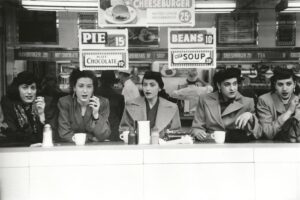
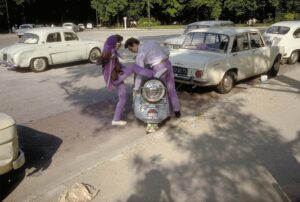
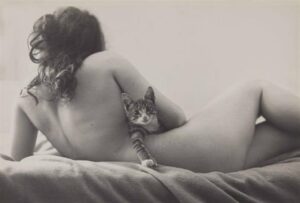
| Anne Sexton | |
|---|---|

photographed by Elsa Dorfman
|
|
And today is the birthday of Anne Sexton (Newton, Massachusetts; November 9, 1928 – October 4, 1974 Weston); poet, known for her highly personal, confessional verse. She won the Pulitzer Prize for poetry in 1967 for her book Live or Die. Themes of her poetry include her long battle against depression and mania, suicidal tendencies, and various intimate details from her private life, including her relationships with her husband and children.
On October 4, 1974, Sexton had lunch with Maxine Kumin to revise galleys for Sexton’s manuscript of The Awful Rowing Toward God, scheduled for publication in March 1975 (Middlebrook 396). On returning home she put on her mother’s old fur coat, removed all her rings, poured herself a glass of vodka, locked herself in her garage, and started the engine of her car, committing suicide by carbon monoxide poisoning.
In an interview over a year before her death, she explained she had written the first drafts of The Awful Rowing Toward God in twenty days with “two days out for despair and three days out in a mental hospital.” She is buried at Forest Hills Cemetery & Crematory in Jamaica Plain, Boston, Massachusetts.
Verse
- We are all writing God’s poem.
- As quoted by Erica Jong, in “Into the lion’s den” in The Guardian (26 October 2000)
To Bedlam and Part Way Back (1960)
- Even so, I must admire your skill.
You are so gracefully insane.- “Elegy in the Classroom”
- Referring to Robert Lowell
- Love your self’s self where it lives.
There is no special God to refer to; or if there is,
why did I let you grow
in another place. You did not know my voice
when I came back to call. All the superlatives
of tomorrow’s white tree and mistletoe
will not help you know the holidays you had to miss.- “The Double Image”
- I rot on the wall, my own
Dorian Gray.- “The Double Image”
- I imitate
a memory of belief
that I do not own.- “The Division of Parts”
- I have ridden in your cart, driver,
waved my nude arms at villages going by,
learning the last bright routes, survivor
where your flames still bite my thigh
and my ribs crack where your wheels wind.
A woman like that is not ashamed to die.
I have been her kind.- “Her Kind”
All My Pretty Ones (1962)
- All who love have lied.
- “The Operation”
- Fact: death too is in the egg.
Fact: the body is dumb, the body is meat.
And tomorrow the O.R. Only the summer was sweet.- “The Operation”
- Need is not quite belief.
- “With Mercy for the Greedy”
- Dearest,
although everything has happened,
nothing has happened.- “Letter Written on a Ferry While Crossing Long Island Sound”
- A woman who writes feels too much,
those trances and portents!
As if cycles and children and islands
weren’t enough; as if mourners and gossips
and vegetables were never enough.
She thinks she can warm the stars.
A writer is essentially a spy.
Dear love, I am that girl.- “The Black Art”
- It would be pleasant to be drunk:
faithless to my tongue and hands,
giving up the boundaries
for the heroic gin.
Dead drunk is the term I think of,
insensible,
neither cool nor warm,
without a head or foot.
To be drunk is to be intimate with a fool.
I will try it shortly.- “Letter Written During a January Northeaster”
- And what of the dead? They lie without shoes
in their stone boats. They are more like stone
than the sea would be if it stopped. They refuse
to be blessed, throat, eye and knucklebone.- “The Truth the Dead Know”
- In a dream you are never eighty.
- “Old”
Live or Die (1966)
- I was spread out daily
and examined for flaws.- “Those Times…”
- I grow old on my bitterness.
- “Two Sons”
- Love! That red disease —
- “Menstruation at Forty”
- Why have your eyes gone into their own room?
- “Your Face on the Dog’s Neck”
- But suicides have a special language.
Like carpenters they want to know which tools.
They never ask why build.- “Wanting to Die”
Love Poems (1969)
- My mouth blooms like a cut.
I’ve been wronged all year, tedious
nights, nothing but rough elbows in them
and delicate boxes of Kleenex calling crybaby
crybaby, you fool!- “The Kiss”
- I am alive when your fingers are.
- “The Breast”
- As for me, I am a watercolor.
I wash off.- “For My Lover, Returning to His Wife”
- You said the anger would come back
just as the love did.- Again and Again and Again”
- He puts his bones back on,
Turning the clock back an hour.
She knows flesh, that skin balloon,
the unbound limbs, the boards,
the roof, the removable roof.
She is his selection, part time.
You know the story too! Look,
when it is over he places her,
like a phone, back on the hook.- “You All Know the Story of the Other Woman”
- Catch me. I’m your disease.
- “Eighteen Days Without You”: December 18th
Transformations (1971)
- Beauty is a simple passion,
but, oh my friends, in the end
you will dance the fire dance in iron shoes.- “Snow White and the Seven Dwarfs”
The Book of Folly (1972)
- With a tongue like a razor he will kiss
the mother, the child,
and we three will color the stars black
in memory of his mother
who kept him chained to the food tree
or turned him on and off like a water faucet
and made women through all these hazy years
the enemy with a heart of lies.- “The Wifebeater”
- In my sights I carve him
like a sculptor. I mold out
his last look at everyone.
I carry his eyes and his
brain bone at every position.
I know his male sex and I do
march over him with my index finger.
His mouth and his anus are one.
I am at the center of feeling.- “The Assassin”
- My eyes, those sluts, those whores, would play no more.
- “Killing the Spring”
A Small Journal (1974)
- It doesn’t matter who my father was; it matters who I remember he was.
- “The Poet’s Story,” January 1, 1972 entry
The Awful Rowing Toward God (1975)
- The tongue, the Chinese say,
is like a sharp knife:
it kills
without drawing blood.- “The Dead Heart”
- I am, each day,
typing out the God
my typewriter believes in.
Very quick. Very intense,
like a wolf at a live heart.- “Frenzy”
45 Mercy Street (1976)
- What can I do with this memory?
Shake the bones out of it?
Defoliate the smile?
Stub out the chin with cigarettes?
Take the face of the man I love
and squeeze my foot into it,
when all the while my heart is making a museum?
I love you the way the oboe plays.
I love you the way skinny dipping makes my body feel.
I love you the way a ripe artichoke tastes.
Yet I fear you,
as one in the desert fears the sun.- “Waking Alone” from The Divorce Papers
- I am murdering me, where I kneeled at your kiss.
I am pushing knives through the hands
that created two into one.
Our hands do not bleed at this,
they lie still in their dishonor.- “Killing the Love” from The Divorce Papers
- I am stuffing your mouth with your
promises and watching
you vomit them out upon my face.- “Killing the Love”
- There is rust in my mouth,
the stain of an old kiss.- “The Lost Lie” from The Divorce Papers
Words for Dr. Y (1978)
- Death,
I need my little addiction to you.
need that tiny voice who,
even as I rise from the sea,
all woman, all there,
says kill me, kill me.- “Letters to Dr. Y.”
- I begin again, Dr.Y,
this neverland journal,
full of my own sense of filth.
Why else keep a journal, if not
to examine your own filth?- “Letters to Dr. Y.”
- God is only mocked by believers.
- “Letters to Dr. Y.”
- Blue eyes wash off sometimes.
- “Letters to Dr. Y.”
Poems 1971-1973 (1981)
- We all walk softly away.
We would stay and be the nurse but
there are too many of us and we are too worried to help.
It is love that walks away
and yet we have terrible mouths
and soft milk hands.
We worry with like.
We walk away like love.- “To Like, To Love”
- To love another is something
like prayer and it can’t be planned, you just fall
into its arms because your belief undoes your disbelief.- “Admonitions to a Special Person” (1974) from Last Poems
Mac Tag
I bade my heart build these poor rhymes:
It worked at them, day out, day in,
Building a sorrowful loveliness
Out of the battles of old times
– WB Yeats
Poetry is my love, my postmark, my hands, my kitchen, my face. – Anne Sexton

No Comments on "The Lovers’ Chronicle 9 November – breathless – photography by Gigo Gabashvili & Robert Frank – verse by Anne Sexton"